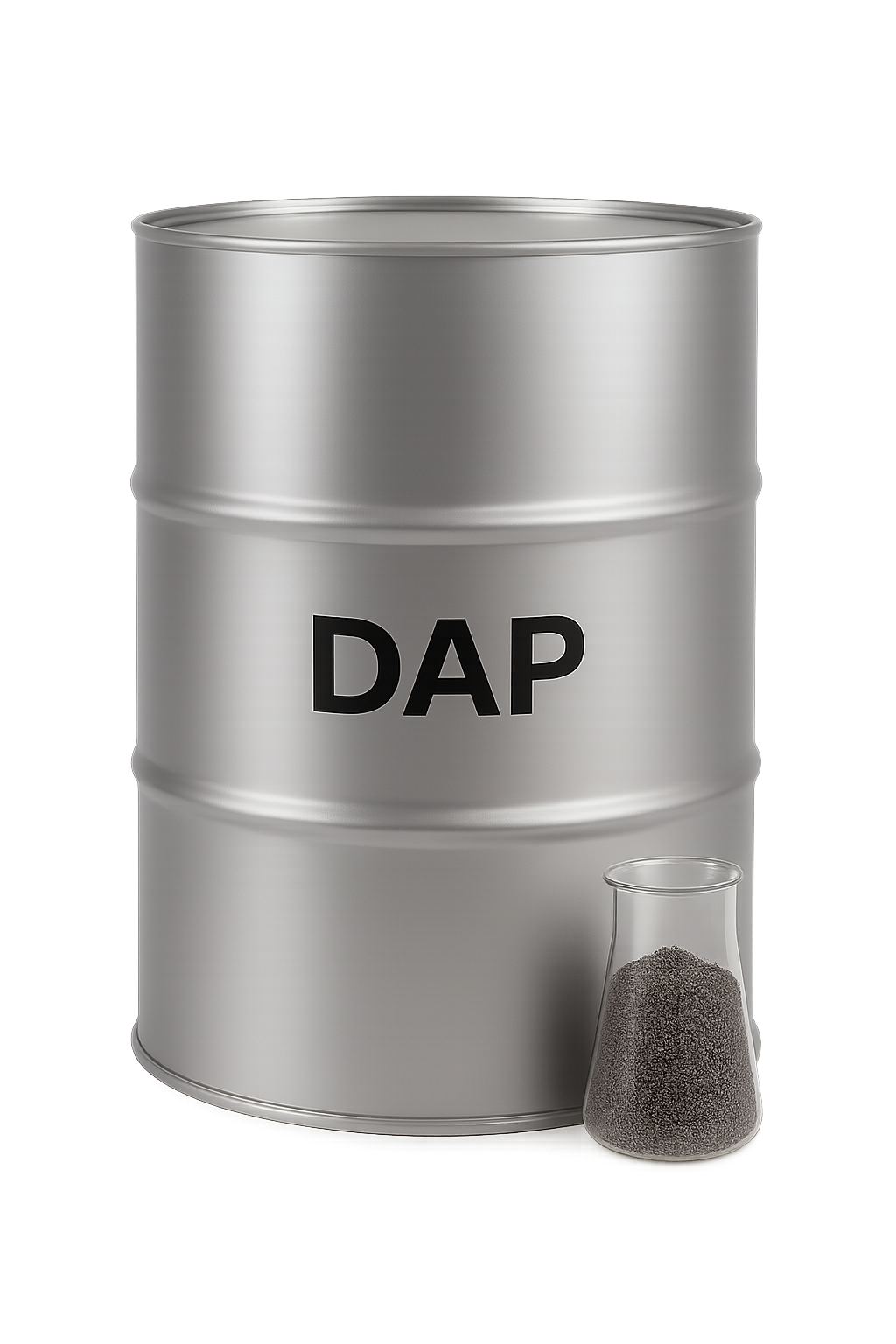
Diammonium Phosphate (DAP)
Overview
Diammonium Phosphate (DAP) is a granular, water-soluble fertilizer with a nutrient composition of 18% nitrogen (N) and 46% phosphorus pentoxide (P₂O₅), making it one of the most concentrated phosphate-based fertilizers available. It provides a balanced supply of nitrogen and phosphorus, essential for early plant development, root establishment, and overall crop productivity.
Technical Characteristics
- Chemical Formula: (NH₄)₂HPO₄
- Appearance: Grey to dark brown granules, free-flowing
- Nutrient Content:
- Nitrogen (N): 18% min.
- Phosphorus (P₂O₅): 46% min. (water-soluble)
- Moisture Content: ≤ 2% by weight
- Granule Size: 90% between 2–4 mm
- Bulk Density: 0.95–1.05 g/cm³
- pH (1% solution): 7.5–8.5
- Solubility in Water: 100% (at 25°C, ~57 g/100 mL water)
Specifications & Standards
- Manufactured according to FAO/WHO fertilizer standards
- Meets ISO 17323 and regional fertilizer quality specifications
- Available in agricultural grade for direct application or blending
Applications
- Agriculture:
- Used as a starter fertilizer to supply phosphorus during early crop growth
- Suitable for cereals, grains, oilseeds, fruits, vegetables, and cash crops
- Can be applied by broadcasting, banding, or fertigation
- Blending: Compatible with other granular fertilizers in NPK formulations
- Industrial Use: Intermediate in the production of fire retardants, yeast nutrients, and specialty chemicals
Performance Advantages
- High Phosphorus Availability: Promotes strong root development and early plant vigor
- Balanced Nutrition: Provides both nitrogen (for growth) and phosphorus (for energy transfer and photosynthesis)
- High Solubility: Ensures rapid nutrient release and uptake
- Versatility: Suitable for a wide range of soils and crops
Handling & Storage
- Hygroscopic: Must be stored in dry, cool, and well-ventilated conditions
- Avoid direct contact with moisture to prevent caking and lump formation
- Use corrosion-resistant equipment for handling and storage
- Shelf life: 12–24 months under proper storage conditions
Compliance & Testing
- Tested for nitrogen content, phosphorus solubility, particle size, and moisture (per AOCS, ISO, and AOAC methods)
- Supplied with third-party Quality & Quantity (Q&Q) inspection certificates (SGS, Intertek, CIQ)
Frequently Asked Questions
1. lobortis augue porta eu. Maecenas eget mauris tristique ?
Praesent aliquet et quam at tempus. Orci var natoque penati magnis disw parturien monascetur ridiculus condimentum pharetra interdum.
2. Sobortis augue porta eu. Maecenas eget mauris tristique ?
Praesent aliquet et quam at tempus. Orci var natoque penati magnis disw parturien monascetur ridiculus condimentum pharetra interdum.
3. Cobortis augue porta eu. Maecenas eget mauris tristique ?
Praesent aliquet et quam at tempus. Orci var natoque penati magnis disw parturien monascetur ridiculus condimentum pharetra interdum.
4. Dobortis augue porta eu. Maecenas eget mauris tristique?
Praesent aliquet et quam at tempus. Orci var natoque penati magnis disw parturien monascetur ridiculus condimentum pharetra interdum.
5. Dobortis augue porta eu. Maecenas eget mauris tristique?
Praesent aliquet et quam at tempus. Orci var natoque penati magnis disw parturien monascetur ridiculus condimentum pharetra interdum.
6. Dobortis augue porta eu. Maecenas eget mauris tristique?
Praesent aliquet et quam at tempus. Orci var natoque penati magnis disw parturien monascetur ridiculus condimentum pharetra interdum.